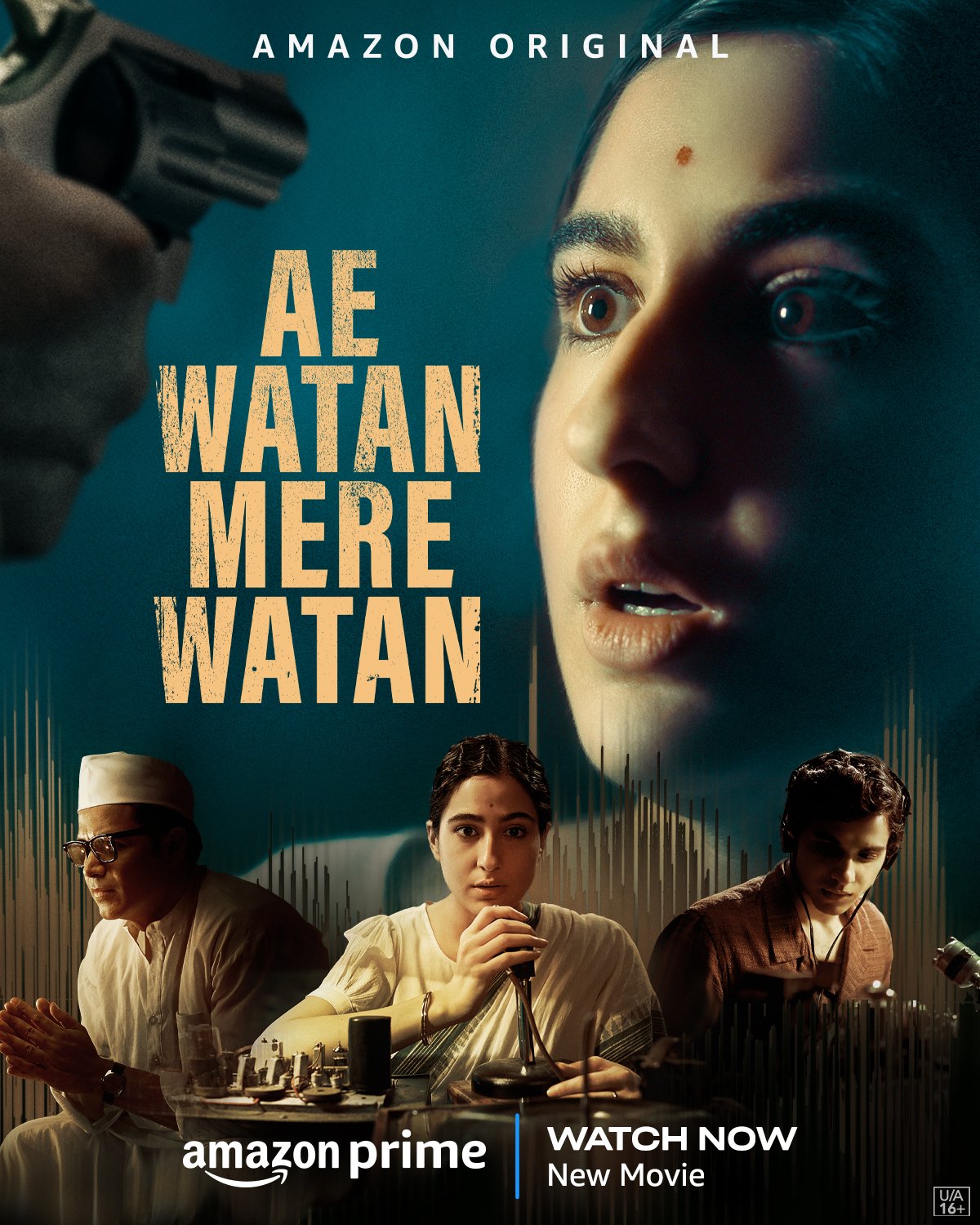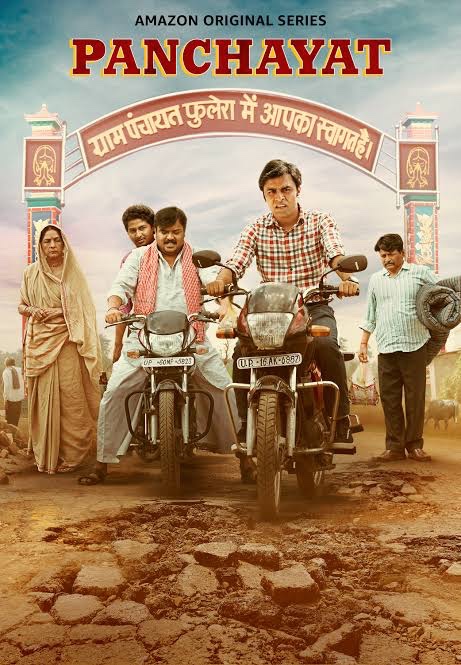Ae Watan Mere Watan: Blurring Lines on What’s Bad
Another day, another OTT release but wonder what remains the same? The massacre of the character’s depth played by the Nepo kids. The recent exhibit of which was witnessed in the Thursday release of Ae Watan Mere Watan starring Sara Ali Khan in the lead role. The plot is set around Usha Mehta who was an avid follower of Gandhian principles and a freedom fighter of India. She is given the due credits for organising the Congress Radio during the Quit India Movement of 1942 when the Britishers arrested the primary forefronts of the freedom struggle. Joining the protests against the imperialist forces at the mere age of eight, Mehta was conferred with the Padma Vibhushan in 1998 that is the second highest civilian award of the Indian Republic.
A group of five friends join Congress to strengthen the struggle against imperialist forces but it is not late before they are reduced to three namely Kaushik, Usha and Fahad. Usha, during one of her early lessons in school, saw her Masterji get mercilessly beaten to death by the police. It was from there that her appetite for subversion grew and she found herself standing face to face with resistance. Usha’s father who is a judge, subservient to the Britishers per his daughter’s perception, house arrests her for getting beaten by the police as she stood against the killing of her Masterji.
The following morning her father comes to her room and together they watch the Siberian Cranes fly and Usha expresses her desire to fly but her father quickly reminds her that in no way can she do that as she has no wings. The scene acts as an essential element of foreshadowing that is about to follow in the movie. And it is the very same time that he introduces her to a radio he brought from London and the child that Usha is, she is extremely thrilled to have that.
The aforementioned is all the insights that are provided into the life of Usha in this movie about the unsung heroes of the freedom struggle, written and directed by Kannan Iyer. When it comes to historical biographies, there is a certain charting of the character’s life that takes place but this flair is lacking in Ae Watan Mere Watan. We are jumping from one instance of her life to another with inaccurate fillers for transition that don’t show what brought on the struggle, survival and success. In the scene where she fights her friend Fahad for the final radio broadcast, she mentions how difficult it has been for her and the reason for her to do the final act is all the more crucial as she is a woman. But, throughout the screenplay, we don’t find an account of her struggle. She leaves home and the journey of those days, her struggles are amiss. These are the moments where the audience connects with the characters, develops empathy for them but the emotional resonance falls flat and the movie fails in its attempt to carry the impact that it set out for.
Usha Mehta’s final act neither gets the elevation it deserved nor does it get the accurate tracing of events. Her representation is that of a defiant girl who moves from one decision onto to another; today it’s swearing to celibacy, the next day it is giving up on her family and the third day, it is starting a secret radio broadcast. This makes her journey choppy and most of it doesn’t find accurate placing. Hence, missing out big time on the patriotic feeling, the goosebumps one feels as they watch the movie.
Now, if you look at all this with the lens of Sara Ali Khan’s acting, it becomes all the more, for the lack of a better word, unpleasant. The limited range of facial expressions, zero conviction in the vocal range when reaffirming “karo ya maro” or “Vande Mataram” and frankly, the dedication to study and imbibe the personality of Usha Mehta, to completely lose yourself in the personality of the part one is playing, are concepts that stand so brilliantly aloof from the actor that her performance is reduced to something so banal, to the degree vanilla appears colourful.
Don’t worry, though. In terms of acting, the film does have a saving grace in its supporting characters. Fahad, played by Sparsh Shrivastav, is an absolute stunner and carries with him such depth when it comes to acting that you do find yourself engaged in active hearing. The scene where he is fighting Usha for the radio broadcast, is so strongly executed by him that one is bound to goosebumps as he gives added insight into his past. On the other hand, Kaushik played by Abhay Varma, is largely put in the space of Usha’s both lover and follower. He is constantly torn between his love for the nation as well as his love for the woman. And he has outdone himself in the portrayal of the pining lover; right from his body language to his facial expression to the ache in his voice, he is a delight on screen.
Another actor that sets apart is Sachin Khedekar who plays Usha’s father and is also a character who is blessed with the redemptive arc. From saying to his daughter that she is incapable of flying because she lacks wings to “tu ab kraantikaari nhi, khudd kranti hai”, he has come a long way. His love charts from conditional acceptance of his daughter to accepting her for who she is and eventually respecting her.
The scripting front of the movies appears really strong with some dialogues mentioned below:
“Tu uski andh-bhakti karta hai jo khudd andh-bhakti ke khilaaf hai”
“Aapka pyaar pyaar nhi, meri bediyaan hai, babuji”
“Hum samanya log hai, beta. Hum sahas ke baare mein kya jaane, woh desh ki azaadi ke liye ladne gayi hai, bach gyi toh desh ko azaad karayegi aur nhi toh shaheed kehlayegi hamari bacchi”
“Bas kuch ke liye inquilab hi pyaar hai aur kuch ka pyaar hi inquilab hai”
There are more such lines but I will refrain from sharing everything. Such lines truly hold the potential to move the audience, have them experience goosebumps at multiple points and make them feel elated if delivered in the right way. But, the poor acting for most of the time has failed so badly that the words are flat and the audience never truly connects to the story. This is exactly where Ae Watan Mere Watan fails as a biopic.
Usha’s home in Ae Watan Mere Watan stands a microcosm of the political Indian landscape and how it found its masses split for its support. In the father figure is a rooted rigidity, a sense of professional security as he works for the Britishers, and a certain apprehension in the ability of the Indian to truly lead them without the imperialist guidance. His stance is juxtaposed with Usha’s who is a girl that is a force to reckon with and marches to breakfree from the shackles of British Raj. It doesn’t even matter if she has to compromise her own personal interests for the same.
The honourable mention goes to the last fifteen minutes of the movie, where the sequences demand complete action from the audience as it goes from the start of the revolution to its aftermath of people being violently murdered by the police. It is also where we see Usha in solitary confinement and there is a very specific glint in her eye when she reads her father’s letter and finally finds the love and acceptance she was looking for. It is in that solitary confinement where Usha is genuinely caged, we see her liberated opposed to when she was in the world where she was freely roaming, she felt caged of her father’s love, of not having contributed to the freedom; a dichotomy is plausible.
Looking over at the aesthetics of the movie and the portions of it shot on the sets, the visual appeal of it ranks pretty high. And given in the time that it is set in, historical accuracy is nailed to the bits. The film is largely shot in contrasts of blues and yellow, generally on a dimly lit canvas that adds to the overall tone of the movie. Being on the topic and not discussing the sounds of the movie, would be a review half served as it has taken on an extensive use of sounds to convey the nuances of the scenes.
FF Ratings: ⭐️⭐️
By Deepali Verma




